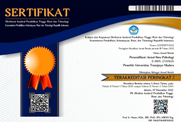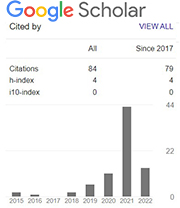Hubungan Antara Keterlibatan Orang Tua Dan Resiliensi Pada Anak Di Desa Tamansari
Abstract
Tamansari Village is part of the Lelea sub-district which is located in Indramayu Regency, West Java. Through brief interviews with several students, indications of behavior that could be classified as bullying behavior were found. Responding to this, the student's parents instilled the values of self-resilience into their son's life.One of the external factors that can help build child resilience is the family. The purpose of this study was to find out whether there is a relationship between parental involvement and resilience in children in Tamansari village. This study used a quantitative approach with 140 elementary school students participating, this research was non-experimental. Participants' ages in this study range between nine to 14 years old. This study also consists of 59 male students and 81 female students. This study also consists of third graders to sixth graders. This study used a purposive sampling technique by distributing questionnaires to elementary school children in grades four, five and six. This study used two measuring instruments, namely the Connor-Davidson Resilience Scale (CD-RISC) adjusted by Campbell-Stein (2007) and also a questionnaire developed by Campbell et al. (1985). The results of the correlation test showed that there was a relationship between parental involvement and resilience in children in Tamansari village (r equal with 0.169, p equal with 0.05, p smaller than 0.046).
Keywords
Full Text:
PDF (Bahasa Indonesia)References
Campbell, James, Connolly, Charlene, & Mandel, Francine (1986). Parental influence of Greek parents on gifted and normal elementary school children. Paper presented at the Greek American Behavioral Sciences Institute Conference, New York.
Campbell-Sills, L, & Stein, M. B. (2007). Psychometric Analysis and Refinement of the Connor-Davidson Resilience Scale (CD-RISC): validation of a 10-item measure of resilience. Journal of traumatic stress. 20. 10190-1028.
Chung, H. F. (2008). Resiliency and character strengths among college students. ProQuest. (Unpublished doctoral dissertation). The University of Arizona, Tucson.
Chung, H., & Ho, R. (2017). Impact of Parental Involvement, Teacher-Student Relationship, and Resilience on Academic Performance among Middle School Students in Kang Won Province, in South Korea. Scholar: Human Sciences, 8(2).
Connor, K. M., & Davidson, J. R.T. (2003). Development of a new resilience scale: the connor-davidson resilience scale (CD-RISC). Article in Depression and Anxiety. 18, 76-82. DOI: 10.1002/da.10113. https://onlinelibrary.wiley.com/doi/pdf/10.1002/da.10113
Desforges, C., & Abouchaar, A. (2003). The impact of parental involvement, parental support and family education on pupil achievement and adjustment: A literature review (Vol. 433). Nottingham: DFES publications.
El Nokali, N. E., Bachman, H. J., & Votruba‐Drzal, E. (2010). Parent involvement and children’s academic and social development in elementary school. Child Development, 81(3), 988–1005.
Epstein, J. L. (2010). School/Family/Community Partnerships: Caring for the Children We Share. Phi Delta Kappan, 92(3), 81–96. https://doi.org/10.1177/003172171009200326.
Fernanda Rojas, L. (2015). Factors affecting academic resilience in middle school students : A case study. Gist Education And Learning research Journal, 11(11), 63– 78.
Keye, M. D., & Pidgeon, A. M. (2013). An Investigation of the relationship between resilience, mindfulness, and academic self-Efficacy. Open Journal Of Social Sciences, 1(6), 1–4. doi: 10.4236/ jss.2013.16001
Luengo, B. P., Pastorelli, C., Thartori, E., Lunetti, C., Di Giunta, L.,Bacchini, D., et al. (2021). Longitudinal relations among maternal self-efficacy, maternal warmth, and early adolescents' prosocial behavior. Parent. Sci. Pract. 21, 24–46. doi: 10.1080/15295192.2020. 1777791.
Mandleco, Barbara & Peery, J. (2000). An Organizational Framework for Conceptualizing Resilience in Children. Journal of child and adolescent psychiatric nursing : official publication of the Association of Child and Adolescent Psychiatric Nurses, Inc. 13. 99-111. 10.1111/j.1744-6171.2000.tb00086.x.
Masten, A. S., & Reed, M. J. (2002). Resilience in development. In C. R. Snyder & S. J. López (Eds.), Handbook of positive psychology (pp. 74–88). New York: Oxford University Press.
Murphey, D., Barry, M., & Vaughn, B. (2013). Positive mental health: Resilience. Child Trends: Positive Mental Health Resilience, January(January), 1-6.
Pena, D. (2000). Parental involvement: influencing factors and implications. The Journal of Educational Research, 94 (1), 42-54.
Richardson, G. E., Neiger, B. L., Jensen, S., & Kumpfer, K. L. (1990). The resiliency model. Health Education, 21(6), 33-39.
Redding, S. (2014). The “something other”: Personal competencies for learning and life. Philadelphia, PA: Temple University, Center on Innovations in Learning. Retrieved from http:// www.adi.org/downloads/TheSomethingOther_rev03.10.15.pdf
Sendra, A., Farré, J., and Vaagan, R. W. (2020). Seeking, sharing and co-creating: a systematic review of the relation between social support theory, social media use and chronic diseases. Soc. Theory Health 18, 317–339. doi: 10.1057/s41285-019-00106-z
Smith, C., & Carlson, B. E. (1997). Stress, coping, and resilience in children and youth. Social Service Review, 71, 231-256.
Tinggapy, Hasanudin & Susiati, Susiati & Goa, Ivana & Hajar, Ibnu. (2022). Active Parental Involvement dalam Membangun Religiusitas Anak pada Masa Pandemi Covid-19 di Kabupaten Buru. Sang Pencerah: Jurnal Ilmiah Universitas Muhammadiyah Buton. 8. 1109-1125. https://doi.org/10.35326/pencerah.v8i4.2558.
Trecca, F., Bleses, D., Højen, A., and Laursen, B. (2022). Direct and indirect effects from parenting self-efficacy and parenting practices to social-emotional adjustment in 3-to 5-year-old children. Acta Psychol. 229:103673. doi: 10.1016/j.actpsy.2022.103673
Utami, C. (2017). Self-Efficacy dan Resiliensi: Sebuah Tinjauan Meta-Analisis. Buletin Psikologi, 25(1), 54 - 65. /*doi:http://dx.doi.org/10.22146/buletinpsikologi.18419*
Wright, M. O. D., & Masten, A. S. (2005) Resilience processes in development. In S. Goldstein, & R. B. Brooks (Eds.), Handbook of resilience in children (pp 17-25). New York: Springer.
DOI: https://doi.org/10.21107/personifikasi.v14i1.18509
Refbacks
- There are currently no refbacks.
Copyright (c) 2023 Agung Valerama, Agoes Dariyo

This work is licensed under a Creative Commons Attribution 4.0 International License.


Personifikasi by Universitas Trunojoyo Madura is licensed under a Creative Commons Attribution 4.0 International License.










